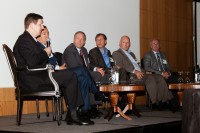Gregg Patterson
President and CEO, “Tribal Magic!”
“Mad Dogs”
There are Mad Dogs in every clubhouse, members who run about, foaming at the mouth, yapping constantly, nipping at the heels of board members, committee members, management and staff. They can infect the body politic and trust—that most fragile of commodities and the very foundation of club governance—can be compromised or destroyed by The Rabid Ones.
Mad Dogs are usually clever sorts with too much time on their hands and too little to do. The club has become their job. They see themselves as guard dogs of “the good”—and are rabid in their search of “the bad”. They slink about, lurking in the shadows, ready to pounce.
Mad Dogs are everywhere—and they’re dangerous creatures.
Pack Animals
Mad Dogs may be alone in their madness, but Mad Dogs love to hunt in packs. They sniff out the bitchers and the moaners, buy them drinks, scratch their wounds, agitate their psyches and embrace their negativity. The Pack inspires—and enables—the madness of The Mad Dog. The Pack makes The Maddest of Mad Dog their Alpha Pooch, their spokesman and Big Biter. The Mad Dogs will always say “the pack agrees”, that the pack is ready to attack—whether the pack is so inclined or not.
Muzzle, Neuter and Put ‘Em In Cages
Managers and Boards need to cage The Wild Ones. Here’s how.
Accept that with Mad Dogs there are no private conversations. You need to acknowledge that a Mad Dog, when sworn to secrecy, will race from your office to bite and infect others with whatever juicy tidbits they got from you during their encounter.
Accept that with Mad Dogs there are no casual conversations. Anything you say, no matter how inconsequent or innocent, will be held against you and will be spun to suit the purposes of the Mad Dog in question.
Acknowledge that Mad Dogs hear what that want to hear, see what they want to see and that they’ll see and hear what they fear most. If they’re scared of a dues increase, whatever you say will convince them that one’s coming.
Bad things happen frequently, but truly Big Bad Things happen less often. Mad Dogs love big bad things when they happen since truly big, bad things are remembered forever. Mad Dogs will use the uproar over admitting woman as full members a decade ago to show how radical and extreme the board was, is and will forever be.
No matter how proud you are of “good deeds done,” Mad Dogs will always find sinister motives behind good deeds. Beat the budget last year? You must have screwed the members by not giving the right hors d’oeuvres at the right time in the right place with the right frequency. Spent more on hors d’oeuvres than budgeted because you made more than you expected on private functions and wanted to give something back to the members? Then you’ve thrown away member dues like drunken sailors. You can’t win.
Because Mad Dogs are truly wild and rabid creatures, their reaction to your comments will be will be a zillion times bigger than the comment made. You mention, during the debate over hors d’oeuvres, that the more reasoned members object to certain members making dinner for their families from the free hors d’oeuvres. Bingo—the Mad Dog spreads the word that the board and management team has called all members cheapo members, that they’re about to cut out all hors d’oeuvres and that they’re considering disciplinary hearings for the Smiths, the Cooks and the Youngbloods for excess consumption of hot hors d’oeuvres in public.
Mad dogs snarl less frequently, bite less harshly when they and those in the pack see that the decision making process is fair. If you dramatize that members are enfranchised; that they can be heard and that their voices are being solicited; that the decision is arrived at in a reasoned, thoughtful and consistent way; that a clear explanation is given for the decision; and that they have every reason to suppose that future decisions will be dealt with in the same reasoned way, then they’ll more willing to accept the decisions made, will growl less fiercely, infect less virulently, slink about more slowly.
When you see a Mad Dog, the last thing you should do is hide behind a tree on the seventh fairway. Arm yourself with the facts (remember that the truth will set you free!) and go pro-active—approach the character and offer up your time to discuss any and all concerns they may have. The key issue is to have all the facts, to anticipate questions in advance and to project the confidence that comes with having thought through an issue before acting.
Mad Dogs spread infection rapidly, but well timed member mailings are faster still. Remember, Mad Dogs are territorial and are therefore quite local in their impact—at least in the beginning. Remember the power of the pen to explain and to defuse issues with the larger club community.
Town Hall meetings can help people vent. Jump into the fire by advertising open forums to discuss specific issues. This defuses the “one issue agenda” of so many Mad Dogs. A couple times a year you can go one step further and hold a presidential press conference for the discussion of any and all issues that might be raised, accepting unscripted questions thrown out willy nilly by Mad Dogs and their packs. Just remember to muzzle the Truly Deranged Stealth Mad Dogs who may be sitting with you on the board!
Get the Board and Manager out and about. Combat Mad Dogs with the walk and talk. Let the membership and the Mad Dogs know that the Decision Makers are walking about, open to conversation, approachable, ready to respond, eager to listen, ready to communicate.
Make sure that the General Manager has frequent staff meetings both for the senior staff and for the entire general staff. Have the Manager address the issues raised by the Mad Dogs. Let people vent. Explain. Guide. Lead them beyond the Mad Dog’s infectious bite.
Search and Destroy
The General Manager is the Board’s Hunter-Gatherer of facts, rumors, scandal and intrigue. The G.M. and their lieutenants should be out “in the trenches” searching out the Mad Dogs for the Board of Directors. They should communicate their observations immediately to the Board. The manager’s role is to prime the board with the personalities and the issues, then arm them with the “knowledge weapons” they need to both attack and to defend against Mad Dogs.
If you see them early enough you can limit their impact. If you confront them and their pack with the facts, you’ll control the amount of yapping and biting and infecting they will do.
There’ll always be Mad Dogs. They go with the territory.
Acknowledge them. Confront them. Neuter them.
And while you’re acknowledging, confronting and neutering The Mad Dogs, never forget to…
Enjoy the journey!!!







